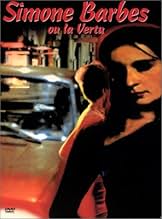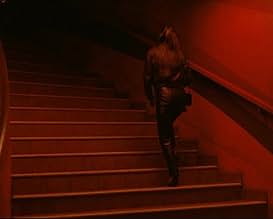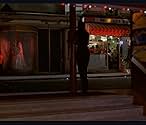Simone Barbès ou la vertu
- 1980
- Tous publics
- 1h 17m
IMDb RATING
6.4/10
435
YOUR RATING
Simone and Martine are usherettes in a porno cinema in Montparnasse. Installed in the hall, they greet regulars, put men in their place, chat and pass the time. At midnight Simone departs to... Read allSimone and Martine are usherettes in a porno cinema in Montparnasse. Installed in the hall, they greet regulars, put men in their place, chat and pass the time. At midnight Simone departs to a lesbian nightclub.Simone and Martine are usherettes in a porno cinema in Montparnasse. Installed in the hall, they greet regulars, put men in their place, chat and pass the time. At midnight Simone departs to a lesbian nightclub.
- Director
- Writers
- Stars
- Director
- Writers
- All cast & crew
- Production, box office & more at IMDbPro
Featured reviews
Although I've seen a lot of restored classics lately very few have engrossed me and this is one among the handful. Moreover, I watched this with zero expectations. And the experience? Extremely good. Ingrid Bourgoin as Simone is fantastic in her role as an usher employed in a theatre showing porn movies. She is a sapphist lost in the Parisians nocturnal urban space. She does her everyday chores and also becomes the object of male gaze who visit the cinema letting themselves be carried away. She is often misunderstood by surroundings and this is especially hard on Simone who breaks out of voluntary seclusion and goes to meet her girlfriend who works as a waitress at a lesbian club which is a world in itself. Later, she drives home with a stranger which is my favourite part of the film. It felt like Simone found temporary shelter but at the same time wants to break free from the urban solitude with approaching dawn. What comes together here with the three locations as a theme and a curious observations is an interesting triptych with bittersweet variety within the Parisian underbelly.
There is an amorous flush throughout the film but there is no vulgar or explicit scenes. That said, i know this is a kind of film that can look boring when viewed on the surface because most of the action takes place indoors. At first glance, the film is nothing revealing, but the main plot is interesting, at the beginning I had a somewhat contradictory feeling from the film, but in the course it immersed me until the end.
Produced by one of my favourite filmmaker Paul Vecchiali's Diagonale company, "Simone Barbes or Virtue" ("Simone Barbès ou la vertu") is an interesting character study in the very spirit of Eric Rohmer, Nina Menkes, Rudolf Thome, Rikiya Imaizumi, Doris Dörrie, Jim Jarmusch, Takis Kanellopoulos ,Sylvia Chang, Yann Gonzalez, Hal Hartley, Jacques Rivette, Atom Egoyan, Jon Jost, Alain Guiraudie, Serge Bozon , Wisit Sasanatieng and Silvio Soldini.
There is an amorous flush throughout the film but there is no vulgar or explicit scenes. That said, i know this is a kind of film that can look boring when viewed on the surface because most of the action takes place indoors. At first glance, the film is nothing revealing, but the main plot is interesting, at the beginning I had a somewhat contradictory feeling from the film, but in the course it immersed me until the end.
Produced by one of my favourite filmmaker Paul Vecchiali's Diagonale company, "Simone Barbes or Virtue" ("Simone Barbès ou la vertu") is an interesting character study in the very spirit of Eric Rohmer, Nina Menkes, Rudolf Thome, Rikiya Imaizumi, Doris Dörrie, Jim Jarmusch, Takis Kanellopoulos ,Sylvia Chang, Yann Gonzalez, Hal Hartley, Jacques Rivette, Atom Egoyan, Jon Jost, Alain Guiraudie, Serge Bozon , Wisit Sasanatieng and Silvio Soldini.
If you want to discover this woman director,you 'd better pick up her steadier,more palatable "Le Jour Des Rois" (1990) ,one of the wittiest French comedies of the nineties which,sadly,remained unsung.
If you 've already seen this film,and you're going to appreciate "Simone Barbès", you'd best forget about all this 1990 delightful comedy,because it's much less accessible .
This effort is made up of three parts :an excellent first one, a shaky and very uneven second one , and a very boring final one.
Simone is an usherette in a porno movie theater with her colleague Martine ; Treilhou,who writes her screenplays, lets her humor flow and it's really a joy to watch the audience enter this special place ;don't expect to get an eyeful though:all we get in the small hall where both employees chat is the soundtrack made of shouts , pantings, and jerky words such as "Ouiiiiiiii" "encore";the contrast with the impassive faces of the usherettes is striking ;we catch glimpses of the clients : some are ashamed,some are in a hurry,some are intellectuals ,you name it ;Simone is thoroughly at ease with this stange bunch and tries to console Martine ,whose boyfriend let her down.
The second part lets us in a lesbian nightclub,a place rarely shown in movies, unlike gay men places ; here Treilhou gives up her collection of mini-portraits ,and depicts the atmosphere :Simone ,herself a lesbian,waits in vain for her girlfriend;her attitude is more self-conscious ,whe's no more the cheeky usherette who laughs at her habitués in the porno theater .The actress is outshadowed by the acts which drowns her out : the Amazons ballet and rock group 12°5 's "Si Je suis Une Nana ,Mec"(if I'm a chick, dude) the words of which may seem ludicrous,but in that context come out almost threatening . This atmosphere had already been depicted by feminist director Jacqiueline Audry's "La Garçonne" (1957) and Treilhou's sequence suffers in this comparison :what was daring in 1957 might seem trite a quarter of century later.
The last part,which entirely takes place in a car is boring and comes as an anti-climax :Martine chats with an aging womanizer who pays the price of loneliness ;nothing new here ,a most inadequate ending to an interesting film about fringe groups .
If you 've already seen this film,and you're going to appreciate "Simone Barbès", you'd best forget about all this 1990 delightful comedy,because it's much less accessible .
This effort is made up of three parts :an excellent first one, a shaky and very uneven second one , and a very boring final one.
Simone is an usherette in a porno movie theater with her colleague Martine ; Treilhou,who writes her screenplays, lets her humor flow and it's really a joy to watch the audience enter this special place ;don't expect to get an eyeful though:all we get in the small hall where both employees chat is the soundtrack made of shouts , pantings, and jerky words such as "Ouiiiiiiii" "encore";the contrast with the impassive faces of the usherettes is striking ;we catch glimpses of the clients : some are ashamed,some are in a hurry,some are intellectuals ,you name it ;Simone is thoroughly at ease with this stange bunch and tries to console Martine ,whose boyfriend let her down.
The second part lets us in a lesbian nightclub,a place rarely shown in movies, unlike gay men places ; here Treilhou gives up her collection of mini-portraits ,and depicts the atmosphere :Simone ,herself a lesbian,waits in vain for her girlfriend;her attitude is more self-conscious ,whe's no more the cheeky usherette who laughs at her habitués in the porno theater .The actress is outshadowed by the acts which drowns her out : the Amazons ballet and rock group 12°5 's "Si Je suis Une Nana ,Mec"(if I'm a chick, dude) the words of which may seem ludicrous,but in that context come out almost threatening . This atmosphere had already been depicted by feminist director Jacqiueline Audry's "La Garçonne" (1957) and Treilhou's sequence suffers in this comparison :what was daring in 1957 might seem trite a quarter of century later.
The last part,which entirely takes place in a car is boring and comes as an anti-climax :Martine chats with an aging womanizer who pays the price of loneliness ;nothing new here ,a most inadequate ending to an interesting film about fringe groups .
So, to present the film. I'll try to be concise. My life (the director's: Marie-Claude Treilhou) brought me to experience a lot of very diverse situations, including at a time working as an usher in a movie theater, which is the movie theater where this film was shot. And I wasn't in that theater to observe anything, I was there to make a living. Suddenly when I was working in this theater I became conscious of the incredible situation which I was in, that had an extraordinary richness for revealing things.
There was the off screen voice, there was the little theater stage on which the usher where, because I was working with Ingrid Bourgoin who was also an usher and eventually played the role of Simon Barbes in the film. So Ingrid Bourgoin was already an extremely strong, natural character. And then there is the fact that we were located looking up from a low angle at the street, which was kind of like a natural screen. So outside we had this nocturnal reality and we were between the two - what was happening in the movie theaters and outdoors. And this incredible circulation, this traffic, this diversity - provided an extremely rich opportunity to talk about society. There was the representation of day, the representation of night. There was real reality, fake reality. There were metamorphoses. The very theatrical possibility of sudden shifts.
So I had, in front of me, this very theatrical rich situation that was also an opportunity to talk about a certain time period, the time period were we are suddenly tipping over into mass pornography. And to tell the truth, it's also a love film. A film about love if you will. It's certainly a film on love. In the background you have this wedding dress-store outside on the street, and inside the movie theater you have, if you will, the backstage of the marriage. And between the two you have these two kinds of witches who are trying to not fall into total despair, by playing out or acting out a fantastic comedy between themselves and with the customers of the movie theater. And that's really the only solution - to play or to act, and have always been that way. The whole film, in a sense, is an extension of that, this movement between romantic love and then sex with all its flaws, sadness and obscurities.
There was the off screen voice, there was the little theater stage on which the usher where, because I was working with Ingrid Bourgoin who was also an usher and eventually played the role of Simon Barbes in the film. So Ingrid Bourgoin was already an extremely strong, natural character. And then there is the fact that we were located looking up from a low angle at the street, which was kind of like a natural screen. So outside we had this nocturnal reality and we were between the two - what was happening in the movie theaters and outdoors. And this incredible circulation, this traffic, this diversity - provided an extremely rich opportunity to talk about society. There was the representation of day, the representation of night. There was real reality, fake reality. There were metamorphoses. The very theatrical possibility of sudden shifts.
So I had, in front of me, this very theatrical rich situation that was also an opportunity to talk about a certain time period, the time period were we are suddenly tipping over into mass pornography. And to tell the truth, it's also a love film. A film about love if you will. It's certainly a film on love. In the background you have this wedding dress-store outside on the street, and inside the movie theater you have, if you will, the backstage of the marriage. And between the two you have these two kinds of witches who are trying to not fall into total despair, by playing out or acting out a fantastic comedy between themselves and with the customers of the movie theater. And that's really the only solution - to play or to act, and have always been that way. The whole film, in a sense, is an extension of that, this movement between romantic love and then sex with all its flaws, sadness and obscurities.
Did you know
- TriviaFirst feature film directed by Marie-Claude Treilhou, until then Paul Vecchiali's first assistant director, it was her debut as a writer,
- SoundtracksCa tourne Saturnin
Written by Matho
Details
- Release date
- Country of origin
- Language
- Also known as
- Simone Barbes or Virtue
- Filming locations
- Rue de la Gaité, Paris 14, Paris, France(Cinevog cinema and night club)
- Production company
- See more company credits at IMDbPro
- Runtime1 hour 17 minutes
- Sound mix
- Aspect ratio
- 1.66 : 1
Contribute to this page
Suggest an edit or add missing content

Top Gap
By what name was Simone Barbès ou la vertu (1980) officially released in Canada in English?
Answer























